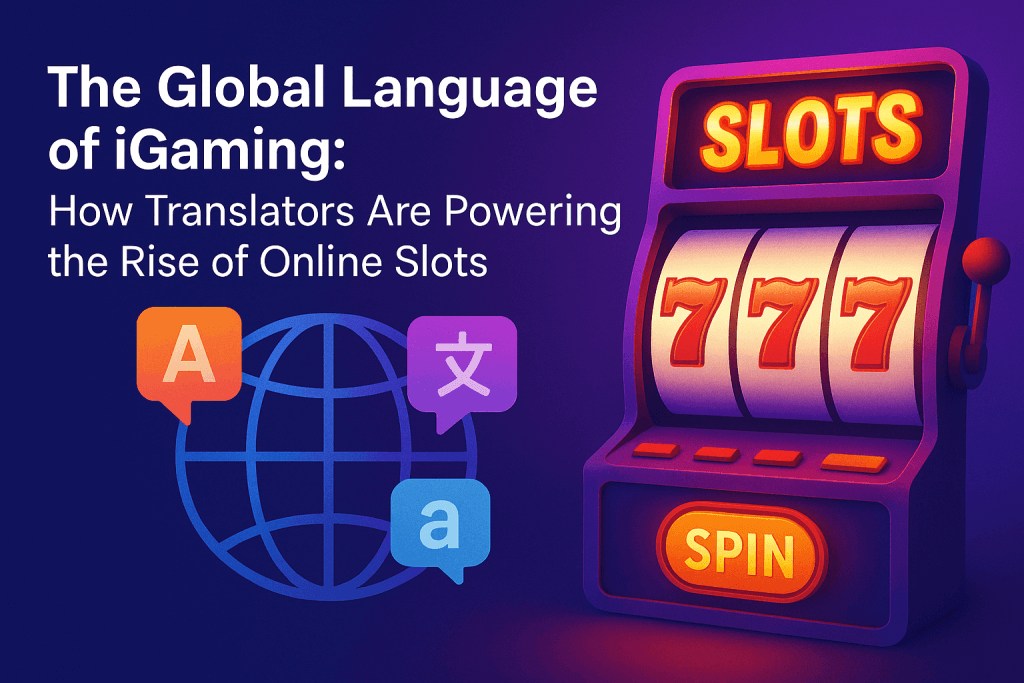In today’s hyper-connected world, digital experiences transcend borders—and few industries illustrate this better than the booming realm of online gaming. As platforms scale across continents, linguistic barriers remain a critical challenge. Whether you’re translating a simple game interface or localizing an entire betting ecosystem, the role of language professionals is no longer optional—it’s pivotal.
The iGaming sector, in particular, demands high linguistic precision and cultural fluency. With financial stakes and real-time interactions involved, accuracy isn’t just preferred—it’s required. From user interfaces to legal disclaimers, language shapes trust and usability in this global market.

The Growth of the iGaming and Slot Market
Online gaming has evolved from a niche digital activity into a multibillion-dollar industry, with online slots being a dominant segment. Fueled by mobile-first experiences, cryptocurrency integration, and international accessibility, the demand for seamless multi-language support is at an all-time high.
To remain competitive, slot platforms not only need to attract new users but also to retain them. And one of the most overlooked tools in achieving this? Multilingual content tailored for specific regions, cultures, and user expectations.
Here’s where translation and localization specialists become crucial. A game’s success in one region does not guarantee its popularity elsewhere unless the user experience is linguistically and culturally optimized.
Bridging the Gap: The Translator’s Role in Slot Gaming
Translators working in the iGaming space do more than convert text—they carry the responsibility of adapting terminology, adjusting tone, and even navigating local betting laws. Slot games often feature cultural references, slang, and idiomatic expressions that lose meaning—or even create offense—when directly translated.
Professional linguists trained in localization work alongside developers, marketers, and compliance officers to ensure that every touchpoint of a platform—from game descriptions to customer support—feels native to the user.
Take, for example, platforms like slot-monster.com, which cater to international audiences with diverse preferences and expectations. Their success hinges not only on the entertainment value of the games but also on how intuitive, trustworthy, and culturally relevant the interface and content feel across different markets. For translators, this means developing fluency in both language and user behavior.
Challenges in Translating iGaming Content
Translating for the iGaming industry presents a unique set of challenges that differ from more conventional sectors like finance or academia:
1. Regulatory Compliance
- Each country has its own regulations around gambling-related content.
- Translators must adapt content to avoid violating local laws or platform restrictions.
2. Terminology Consistency
- Maintaining consistent use of terms such as “jackpot,” “wild symbol,” or “payout” across various games and languages is vital for user understanding.
- Glossaries and style guides tailored to gaming help ensure continuity.
3. Time Sensitivity
- Many online slots are launched simultaneously in multiple markets.
- This demands rapid yet high-quality translation, often under tight deadlines.
4. Tone and Engagement
- iGaming content needs to be engaging while remaining informative.
- Achieving this balance in multiple languages is a refined skill that requires industry experience.
Best Practices for Translators in the Gaming Niche
Professional translators looking to enter or excel in the iGaming space should adopt a few best practices to meet the industry’s evolving demands:
- Understand the Game Mechanics: Play the game or watch gameplay videos to understand the context behind the terms.
- Stay Updated on Industry Trends: Familiarize yourself with changing legal landscapes and evolving gaming terminology.
- Use CAT Tools Wisely: Translation memory tools can increase consistency and efficiency, especially for recurring terms.
- Collaborate with Developers and Designers: Being looped into the product development cycle ensures translation fits the UX design.
Future Opportunities: AI and Machine Translation in iGaming
While AI and machine translation tools are gaining traction in many industries, the iGaming sector remains human-driven. Nuance, regulatory concerns, and the need for cultural contextualization make full automation risky. However, hybrid models—where machine output is post-edited by professionals—are emerging as a cost-effective solution for high-volume content like in-game messages or promotional materials.
For language professionals, this shift underscores the need to develop skills beyond translation—such as transcreation, UX writing, and localization strategy—to stay competitive.
Final Thoughts
The fusion of language and technology has never been more evident than in today’s global iGaming landscape. As platforms expand their reach, the demand for high-quality, culturally aware translation services will only continue to grow. For translators and localization experts, this presents not just a challenge—but an exciting opportunity to shape how millions of users interact with entertainment, finance, and digital communities worldwide.

